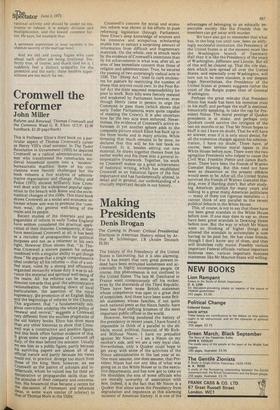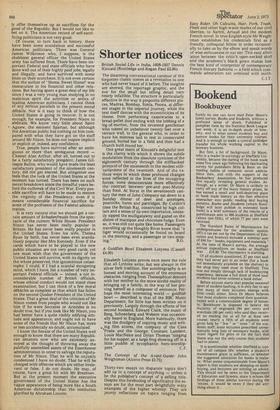Making Presidents
Denis Brogan
The Coming to Power: Critical Presidential Elections in American History edited by Arthur M. Schlesinger, J.R (Andre Deutsch 0.50) The history of the Presidency of the United States is fascinating, but it is also alarming. For it has meant that very great powers indeed have been. entrusted sometimes and accidentally to highly incompetent people. Of course, this phenomenon is not confined to the United States. The late M. Deschanel in France went conspicuously off his rocker, even by the standards of the Third Republic. There have been some British statesmen whose competence was open to a great deal of scepticism. And there have been some British statesmen whose families, if not quite such national pests as the Nixon family, have been less than edifying kinsmen of the most important public officer in the world.
However, having pondered the history of the presidency in recent years, I have found it Impossible to think of a parallel to the debacle, moral, political, financial, of Mr Richard Milhous Nixon. I have no prejudice against Mr Nixon — I am a Nixon on my mother's side, and we are a very loyal clan. Nevertheless, only a Quaker could hope to get away with some of the activities of the Nixon administration in the last year or so. One must assume, one does assume, that President Nixon had not any idea of what was going on in the White House or in the executive departments, and has now got to take on his shoulders the sins of some officials who are morally unworthy of association with him. Indeed, it is the fact that Mr Nixon is a Quaker that alone saves the Presidency from degradation and impotence at this alarming moment of American history. It is one of the advantages of belonging to an ethically impeccable society like the Friends that its members can get away with murder.
We have also got to remember that what has, in the long run until now, been an edify ingly successful institution, the Presidency of the United States is at the moment more like the Washington branch of Tammany Hall than it is like the Presidency of the years of Washington, Jefferson and Lincoln. But all of this will be cleared up. That the vile slanders which now spread all over the United States, and especially over Washington, will turn not to be mere slanders, is our deepest hope. Nevertheless, the Presidency of the United States at present suggests rather the court of the Borgia popes than of General Washington.
Perhaps the great mistake that President Nixon has made has been his immense trust in his staff; and perhaps the staff is destined, historically speaking, to take the rap for President Nixon. The moral prestige of Quaker presidents is at stake, and perhaps only Quakers could survive the intrigues of the last six months or so. That Mr Nixon hopes to bluff it out I have if° doubt. That he will have an answer, even if it is only stout denial, for all the numerous charges against his administration, I have no doubt. There have, of course, been serious moral lapses in the White House before now. There were the two egregious Presidents who helped to cause the Civil War, Franklin Pierce and James Buchanan. There have been the friends of Warren Gamaliel Harding. But this need not have been as disastrous as the present debacle would seem to be. After all, the United States survived the friends of Warren Gamaliel Harding, even if Harding didn't. But after studying American politics for many years and talking to a great many American politicians — many of them not rigorous moralists — I cannot think of any parallel to the recent political debacle in the White House.
This, of course, is not to say that there have not been great scandals in the White House before now. If one may dare to say so, there have been great scandals in Downing Street before now. But the way in which Mr Nixon went on thinking of higher things and allowed the scandals to accumulate is now having to be paid for. He has close friends, though I don't know any of them, and they will doubtless rally round. Possibly various important Federal officials, various important business men, various important business statesmen like Mr Maurice Stans will willing
ly offer themselves up as sacrifices for the good of the Republic. But I would not like to bet on it. The American record of self-sacrificing politicians is not very good.
Of course, to turn back in history, there have been some scandalous and successful American 'politicians. There was General James Wilkinson who, I suppose, is the shabbiest general officer the United States army has suffered from. There have been important Federal and state officials who have done well out of their highly paid jobs, legally and illegally, and have survived with some blots on their scutcheon. It is not even certain that the author of' Home, Sweet Home!' was immaculate in his financial and other relations. But having spent a great deal of my life since I was a very young man studying in no malicious spirit the activities or antics of leading American politicians, I cannot think of any serious parallels to the present moral debacle. Nor is it easy to think of how the United States is going to recover. It is not enough, for example, for President Nixon to abdicate. We know very little about Spiro Agnew, the eminent Spartan, but although the American public has nothing on him compared with what they have got on the staff around Mr Nixon, he does not inspire implicit or explicit or, indeed, any confidence.
True, people have survived after an ambiguous or more than ambiguous record — Chester Alan Arthur, after all, turned out to be a fairly satisfactory preWdent. James Gillespie Baline, who would kave made the least satisfactory president of the nineteenth century, did not get elected. But altogether one feels that the luck of the United States at the moment has turned. There has been no such moral breakdown since the dreadful years beford the outbreak of the Civil War. Every possible sacrifice will have to be made to restore the virginity of the Presidency, even if it means considerable financial sacrifice for some of the profiteers of the Federal administration.
It is very natural tnat we should get a certain amount of Schadenfreude from the spectacle of the current White House. President Nixon has never been really popular in Britain. He has never been really popular in the United States. Even his wife, Thelma Ryan by birth, has never been even scandalously popular like Mrs Kennedy. Even if the cards which have to be played in the new public situation are not very good cards, yet one must wish that the government of the United States will survive, with its dignity on the whole preserved, this ignominious catastrophe. I could, if I had a scandal mongering mind, which I have, list a number of very important Federal officials — indeed, a not inconsiderable number of British officials, whose ethical conduct would not stand close examination; but I can think of a few moral debacles as complete as that which has fallen on the second Quaker President of the United States. That a great deal of the criticism of Mr Nixon comes from people who would not like him if he were Socrates or Aristides is no doubt true, but if you look like Mr Nixon, you had better have a quite visibly edifying attitude and appearance, and ought not to have some of the friends that Mr Nixon has, more or less accidentally no doubt, accumulated.
I know the Senate of the United States well enough to know that there are many Republican senators now who are extremely annoyed at the thought of throwing away the painfully assembled assets of the Eisenhower administration in order to salvage the reputation of Mr Nixon. That he will be unjustly condemned I have no doubt. That he will be charged with offences which are either irrelevant or false, I do not doubt. He may, of course, have a great hit with Mr Brezhnev. But at the present moment the executive government of the United States has the
• vague appearance of being more like a South American dictatorship than the institution glorified by Abraham Lincoln.



































 Previous page
Previous page